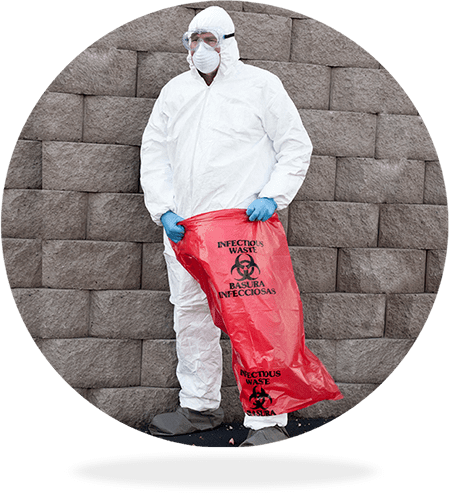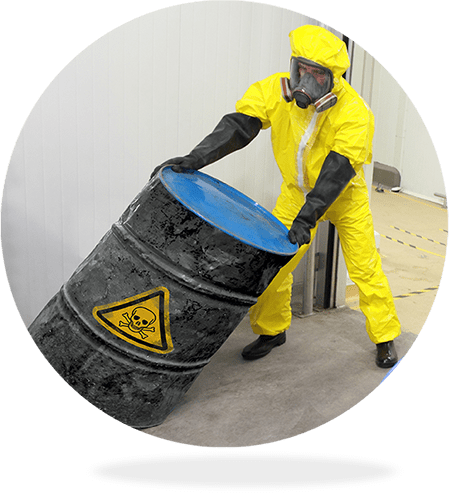
HAZARDOUS WASTE
Cost-Effective & Compliant Hazardous Waste Management Services
SERVICE
Lab Packing
Lab packing is the term used to describe the process of:
- Categorizing small containers of chemicals, solvents, industrial supplies, etc.
- Repackaging and packing them into 55-gallon drums with compatible absorbent.
- Overpacking leaking or damaged 55-gallon drums
- Labeling and preparing the drums to be shipped for disposal.
- Providing complete paperwork (manifests, shipping inventories, SDS, etc.) for shipment. Upon completion, the lab pack company provides a complete and detailed drum inventory, packing list and can arrange transportation and disposal.
Drum Packaging includes profiling, packaging, labeling, manifesting, transporation and treatment of your non-hazardous, hazardous and RCRA items)

SAVE 30% TODAY
GUARANTEED
SAVINGS!
TRANSPORTATION
Licenses
MediWaste is licensed to transport Hazardous and RCRA wastes.
TREATMENT
MediWaste partners with facilities for treatment of your hazardous waste, we recycle and destroy items all in compliance with Federal and State requirements
RECYCLING
MediWaste looks for the best and economical alternatives in handling hazardous items that may have the opportunity to be Recycled, Reused or Reduced.
RCRA
As provided by the EPA ( include link to document) you must first determine if the solid waste you are handling is regulated under RCRA, ask yourself the following questions:
1. Do I Handle a Solid Waste?40 CFR 261.2 defines “solid waste” as any discarded material that is not excluded under Part 261.4(a) or that is not excluded by variance granted under Part 260.30 and 260.31. A discarded material is any material which is:
- Abandoned, as explained in Part 261.2(b); or
- Recycled, as explained in Part 261.2(c); or
- Considered inherently waste-like as explained in Part 261.2(d); or
- A military munition identified as a solid waste in Part 266.202.

2. Has My Solid Waste Been Excluded from the Regulations under Part 261.4?
The list of general exclusions can be found in 40 CFR 261.4. If the solid waste that you handle has been excluded, either by rule or special variance, then you do not need to notify EPA for that solid waste unless otherwise stated in the regulations. If your solid waste was not excluded from regulation, you need to determine if it is a hazardous waste that EPA regulates. EPA regulates a solid waste as hazardous waste in two ways:
- By specifically listing the solid waste as a hazardous waste and assigning it a unique EPA Hazardous Waste Code Number; or
- regulating it because it possesses any of four hazardous waste characteristics and assigning it a generic EPA Hazardous Waste Code Number.
3. Is My Solid Waste Specifically Listed as a Hazardous Waste?
Parts 261.30 through 261.33 identify certain solid wastes that EPA has specifically listed as hazardous. Persons who handle listed hazardous waste are subject to regulation and must notify EPA of their hazardous waste activities unless they are exempted as discussed below. Refer to these regulations to see if your solid waste is included as a “listed hazardous waste.” If you are handling a newly regulated hazardous waste and have already notified EPA prior to that hazardous waste being regulated and already have an EPA Identification Number, you do not need to submit a subsequent notification for that newly regulated hazardous waste.
4. Does My Solid Waste Possess a Hazardous Characteristic?
Even if your solid waste is not specifically listed as a hazardous waste, it may still be hazardous because it exhibits certain hazardous characteristics. These characteristics are:
- Ignitability
- Corrosivity
- Reactivity
- Toxicity
Parts 261.20 through 261.24 explain each of the characteristics and outline the testing procedures you should use to determine if your solid waste meets these characteristics. Persons who handle characteristic hazardous waste that is regulated must notify EPA of their activities unless they are exempted, as discussed below. If you are handling a newly regulated hazardous waste and have already notified EPA prior to that hazardous waste being regulated and already have an EPA Identification Number, you do not need to submit a subsequent notification for that newly regulated hazardous waste.
5. Has My Hazardous Waste Been Exempted from the Regulations under Parts 261.5 and 261.6(a)(3)?
Parts 261.5 and 261.6(a)(3) list certain hazardous wastes that are not subject to RCRA regulation. If the hazardous waste that you handle has been exempted, then you do not need to notify EPA for that hazardous waste.
Call us for assistance in managing all your hazardous waste streams.



